
I’ve already had some extraordinary experiences during my all-too-brief stay at the Herkimer Diamond Mines KOA, a camping resort that prides itself on “edutainment”. I’ve tried my hand at mining for Herkimer Diamonds in the quarry – these magnificent quartz crystals that almost pop out of their rocky prison as if cut and polished by Mother Nature. I’ve done sluicing and had the delight in finding gemstones, diamonds and fossils, and explored the massive retail store and museum with its fine display of rocks, gemstones and fossils – including the large Herkimer diamond cluster in the shape of a cross that was discovered the morning of September 11, 2001, and the skull of a triceratops. And I’ve enjoyed the special atmosphere of a campground – or rather, a camping resort – the peaceful sounds of the flowing West Canada Creek, the smells of campfires, and the giggles of kids riding bikes passed my creekside cabin, themed for dinosaurs.
But there is more to do: the Herkimer KOA is but seven miles away from the Erie Canal, that marvel of human ingenuity and engineering which helped unify the fledgling nation and propel it into the Industrial Revolution. There, Dr. Renee Shevat, who owns the Herkimer Diamond Mines KOA, has turned a building that used to warehouse buoys into a gigantic indoor “mall” showcasing artists, artisans, writers, and companies, in a most pleasant environment (come on Saturdays, when there are free tastings), a marina where you can take a delightful 90-minute narrated cruise on the Erie Canal, climaxed with going through a lock that lifts (or drops) the boat 20 feet, and an excellent restaurant, the Waterfront Grille, with a lovely setting on the canal.
Cruising the Erie Canal
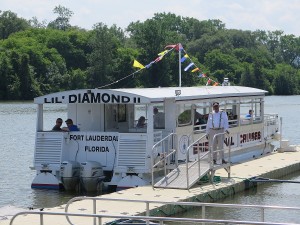
Captain Jerry Gertz delivers a delightful narration (part on tape, but he interjects and takes questions) which is interesting, engaging, and very entertaining, delivered with wonderful humor. The climax of the 90-minute cruise comes when you go through Lock 18.
Along the way, he points out interesting sights and fascinating (and I mean fascinating) details about the history and the remarkable engineering of the Erie Canal, and why the Erie Canal was so crucial to opening the West, unifying the fledgling nation, making New York the Empire State and New York City the financial capital of the world. Captain Jerry came to the Erie Canal in his “retirement” – after operating one of the largest tour boat companies in Florida.
I am surprised to learn that the peak use of the Erie Canal (this is actually the third “incarnation” of the canal – the first was Governor DeWitt Clinton’s Ditch, built 1817-1825 despite enormous skepticism and opposition and was so successful, it had to be enlarged just 10 years later and this, the third, is the Barge Canal) was not in the 1920s but in the 1950s, when over 5 million tons of cargo came through. And the canal’s undoing wasn’t even the Transcontinental Railroad (though that helped), but Eisenhower’s Interstate Highway (and volume on the canal tracks with fuel prices), which did not close down, as the Erie Canal did, from November to April, and even more devastating, the opening of the St. Lawrence Seaway, which could carry much larger ships.
Since the 1980s, the Erie Canal has been “re-purposed” from commercial use to almost entirely recreational. And while people like Dr. Shevat and her husband who grew up in the 1950s near the canal would have never thought to boat on it – it was regarded as little better than a sewer with the pollution and smell – now it is this bucolic place, with the canal towns finding new life and new quaint housing cropping up along the canal, and the original towpath used by boys leading mules to pull the boats, is now a multi-use path extending almost the entire 363-mile length, from Buffalo to Albany (30% of the trail still needs to be completed; when it is completed, it will be longest multi-use trailway in US, and then can be combined with the Hudson Greenway down to New York City.).
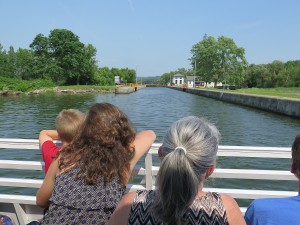
Today’s Barge Canal extends 524 miles with 57 locks, each lock chamber made 328 feet long, 45 ft wide (and using the same century-old motors, manufactured by General Electric). This canal was completed in 1918 at a cost of $151 million (would cost $2.5-$3 billion in today’s dollars), but it could not be built today because of environmental restrictions (while the earlier canals probably could not be built either because of environmental and labor protections).
“The Erie Canal was the most important economic, transportation structure; only the Intercontinental railway had the same impact,” he tells us. “It was more than trade – it was about religion (7th Day Adventist), women’s suffrage, abolition. The underground railroad used the canal.
“It was the Internet of its day – the first attempt at networking and globalization,” he declares.
For the original 13 states to prosper, he tells us, they needed to open the West in order to tap those natural resources, such as lumber, as well as access to the inland waterways like the Mississippi River. “But the Appalachians were hard to get over. The route was impossible to cross –they couldn’t blast mountains then – they only had black powder.”
President Madison, a Jeffersonian, didn’t see the benefit to the nation of such a canal, so it was left o New York State to finance the project on its own.
“DeWitt Clinton worked tirelessly.” There was tremendous skepticism – no one actually had the technical expertise to build such a canal. But a “New York Memorial” speech Clinton delivered as a State Senator ignited the Legislature which authorized $7 million in bonding.
Of the three men overseeing construction, only one had any engineering background. They had to invent new methods and tools – the breakthrough was inventing hydraulic cement that hardens under water.
Now where to build? DeWitt Clinton realizes that $7 million may not be enough money to finish the project, so he has the construction start where it is easiest – in soft, flat farmland – and in the middle of the state, in Rome, and tells them to dig east and west from there. “It starts in the middle of nowhere, goes nowhere, so the state would have to give them more money.” Captain Jerry relates.
The original canal was built by 350 workers who were being paid 80c/day – they carved the ditch 40 feet wide and just four feet deep, 363 miles, from Albany-Buffalo, 83 locks, which take a boat the 565 feet difference in elevation. In the first year, was a huge success, as the cost of commerce dropped from $125/ton; one year after canal opened, to $5/ton to transport.
By now, we have cruised to Lock 18, which Captain Jerry says is still powered by the original GE motors from 1912 (the earlier canals were not motorized, but were opened and closed manually). The lock will lower us 20 feet, emptying 2.5 million gallons of water in just 7 1/2 minutes (and reversing the process when we return).
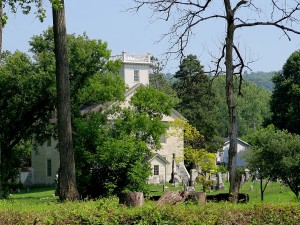
As we pass Fort Herkimer Church, which he says is the second oldest surviving church, dating from 1767, Captain Jerry also tells the story of General Herkimer – probably the most important Revolutionary War hero few have heard of:
General George Washington commissioned Herkimer as a general but he had no army. But when Herkimer learned that the British had taken Fort Stanwix in July 1777, he gathered up a militia formed mainly of German immigrants to gather at Fort Dayton (now Herkimer, New York), to begin the 40-mile westward march to the besieged Stanwix.
Herkimer was betrayed by Molly Brant, who sent word of their march to her brother, Joseph Brant, the Mohawk leader.
On August 6, Herkimer and his men were ambushed by a group of Loyalists and Mohawk Indians at a bloody battle that came to be known as the Battle of Oriskany, during which Herkimer was mortally wounded – he died 10 days later.
it is one of bloodiest encounters of War – 400 were killed in just 6 hours.
But the British blockading Fort Stanwix believed reinforcements were on their way and retreat – giving the Patriots their first victory of sorts. And the British General John Burgoyne went on to a major defeat at Saratoga (at the hands of General Benedict Arnold), turning the tide of the war for the Patriots.
“Herkimer was one of saviors of American Revolution,” Captain Jerry says, no doubt introducing most of us to a historic figure we had never heard of before.
Near here, is the Herkimer Homestead, which during the Revolutionary War consisted of 7 building on 3000 acres. The Historic Herkimer House, a 1762 mansion, can be visited in Little Falls. And you can easily reach the Fort Herkimer Church, on Rte. 5S.
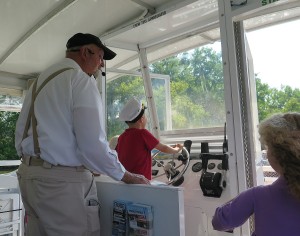
This day we are on a small, 36-passenger boat, the Lil Diamond II (he even lets a couple of the kids drive it for awhile), but he also has a large boat, the Lil Diamond III, that is utilized by groups (including weddings).
($19/adults, $12/3-10; reservations recommended, departs 1 & 3 pm daily, mid-May through mid-October, rain or shine. Erie Canal Cruises, 315-717-0077, www.eriecanalcruises.com.)
Gems Along the Mohawk
Gems Along the Mohawk is one of the most interesting shops you will ever encounter.
It serves as a Visitor Center for travelers coming off of I-90 (it is directly across from the ramp at Exit 30), and staff cheerfully greet guests and provide travel information (and rest rooms) for weary travelers. It offers a wonderful restaurant with stunning views of the canal, and a marina from which you can take the 90-minute Erie Canal Cruise.
But it is so much more. The shop is a showcase for New York and the Mohawk Valley producers – actually 70 different merchants whose items are displayed, like Mele jewelry boxes (based in Utica since 1912, which you have probably seen in major department stores), and Salida Tea (check out the collection of Red Rose figurines and the giant porcelain tea set); Also, Jim Parker Folk Art. And it also heralds the region’s legacy companies, like Revere Copper Products, started by Paul Revere, 1801), and Remington Arms (200 years old, the same company as produced the iconic typewriter and other items like sewing machines and even a bridge – you can even visit the Remington Museum nearby); HM Quakenbush, founded in 1871 in Ilion, which is America’s largest and oldest manufacturer of nutcrackers; Beech Nut, founded in 1931 in Amsterdam, the baby-food company
“This is what created Mohawk Valley,” Melody Milewski, General Manager, tells me as she gives me a tour.
“We don’t just take anybody,” she says. “All the associates want to show their story, their connection to the Mohawk Valley.”
Come on Saturdays and Sundays, and you can enjoy tastings (and free coffee and tea) at about 17 of the 70 shops.
But when you peruse the shop, it is astonishing how much you learn.
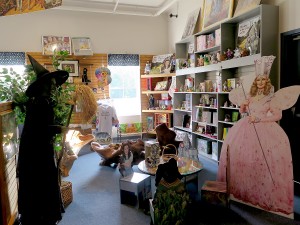
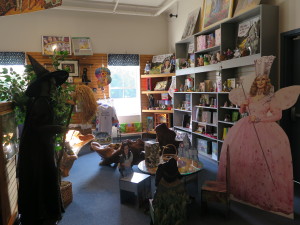 The kids can play in an area devoted to the Wizard of Oz. Why the Wizard of Oz, I ask? The famous author, L. Frank Baum, lived not far from here (you can visit the All Things Oz Museum, in Chittenango), but his mother-in-law, Matilda Joslyn Gage, had an even greater connection and for the first time, I learn that she was instrumental in the Women’s Rights movement. She had connections to the Oneida women and incorporated their ideas of a woman’s right to property and child custody and selecting the chief at a time when women had rights to none of these. (I take this basic knowledge with me to Seneca Falls, to the Women’s Rights National Park, and to Fort Stanwix which picks up on the themes of the “clash of cultures” between Europeans and Indians).
The kids can play in an area devoted to the Wizard of Oz. Why the Wizard of Oz, I ask? The famous author, L. Frank Baum, lived not far from here (you can visit the All Things Oz Museum, in Chittenango), but his mother-in-law, Matilda Joslyn Gage, had an even greater connection and for the first time, I learn that she was instrumental in the Women’s Rights movement. She had connections to the Oneida women and incorporated their ideas of a woman’s right to property and child custody and selecting the chief at a time when women had rights to none of these. (I take this basic knowledge with me to Seneca Falls, to the Women’s Rights National Park, and to Fort Stanwix which picks up on the themes of the “clash of cultures” between Europeans and Indians).
Indeed, the Mohawk Valley was The West, a vast wilderness. James Fennimore Cooper’s “Last of the Mohicans: was set in part in Glens Falls). This was the land of the Mohawk, the Oneida and the 6 Nations.
The shop features a bookstore stocked by Ganesvoort House Books (who also operates a bed-and-breakfast in Little Falls), which offers books about Gage, and the native American influence on Women’s Rights movement, “Sisters in Spirit,” by Sally Roesch Wagner as well as scores of other local writers.
This is all news to me. Just walking around introduces me to people and places I had never heard of before – like Fort Stanwix which I will later visit in Rome, when I take the 400-mile Cycle the Erie Canal tour (I will get to camp out at the Fort, where Melody says she participated in excavations before the National Park Service rebuilt it.)
Gems Along the Mohawk (800 Mohawk Street, Herkimer NY 11350, 315-717-0077, 866-716-GEMS, info@gemsalongthemohawk.com, www.gemsalongthemohawk.com).
Waterfront Grille
Today, cruising the Erie Canal and dining at the Waterfront Grille, we see a bucolic scene, but when Dr. Renee Shevat and her husband, Sam, were growing up, during the peak of commercial traffic on the Erie Canal, it was a noxious sewer.
The canal has gone through a major re-purposing – it carries very little commercial traffic but is almost exclusively used for recreation – and so have the canal towns the grew up because of the canal, then went into a tailspin with its decline.
The complex that is now a retail store, visitors center, restaurant and marina was originally a terminal building for tending buoys for the Barge Canal, before Dr. Shevat convinced the state to let her build a private enterprise on the canal, which is part of the Heritage Corridor.
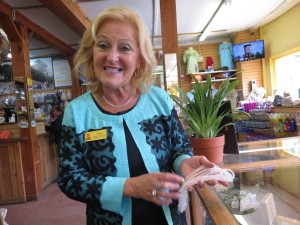
Dr. Shevat, who has her PhD in finance and strategic planning, and was the vice president of a college (with ambition of becoming a president someday) utilized all of her skills and experience when she took over running the campground and mining attraction from her father – developing four distinct business units.
She also clearly has not left her academic credentials behind, but manages to incorporate “edutainment” into every aspect of the experience – and not just for the young campers, but for the adult campers and the young people who work as counselors, as well.
“I like making science fun,” she says. The activities that are offered daily incorporate gemology, paleontology, robotics, geology. Many of the lodges are themed around science – solar powered lodges, dinosaurs, a fossil pit, an astronomy lodge (with a real computer-operated telescope for the exclusive use of that cabin), and a robotics lodge.
“I don’t want them just to have a summer job but a resume,” she says of her counselors. “I encourage them to do projects.” So Blair and Josh, both student teachers, created the catalog of gems and fossils and a curriculum to teach their colleagues, and counselors will be helping campers build a robot and a crystal radio.
That philosophy was genesis of Professor Gadget’s Lodge.
The Robotics Lodge was designed by the 2013-2014 graduating senior class of engineers from Binghamton University’s Watson School of Engineering and Applied Science. At the Herkimer Diamond Mines, there are K-12 projects and programs offered throughout the year, but this was the first project at the collegiate level, giving students a the opportunity to design a commercial project from the ground up.
This process involved five interdisciplinary projects which were completed by two teams of 12 students. Each project allowed not only for the education of the students who created it, but also for the continued education of KOA guests. Campers of all ages learn about motors, motion sensors, battery power, chain machines, vectors and inertia.
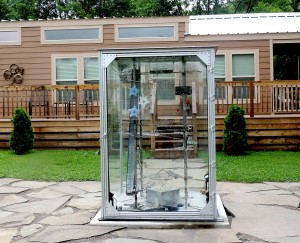
When you walk by the lodge, the first thing you notice is the 6’ tall weatherproof case engineered by Danielle Brogna, which contains a prototype of a Rube Goldberg rolling ball sculpture. Inside, the lodge utilizes an innovative and interactive lighting system designed and programmed by computer engineering major Elan Ashendorf; a mechanical lift system and hammock which lets guests practice their own engineering skills, and has robotic display boxes lining the wall.
“What is special about this project,” says Shevat, “is that each student was allowed the freedom to design to their strengths, which they believed would be enjoyed by many campers.
“The partnership with Binghamton University and campers, as consumer consultants, was very rewarding. And, yes, we would do it again with another scientific theme!.”
Also, during the season, the KOA offers a Rock and Gem Camp for about 100 kids (26 had to be turned away for the first camp) as well as Geology weekends for Girl Scouts and Boy Scouts (conferring a Geology badge).
“Diamonds and the Erie Canal – two unique attractions – I want to be the centerpiece for dinner conversation: ‘Do you remember when we….?’” Dr. Shevat says.
The Herkimer Diamond KOA is open April through October (peak season rates apply July and August.) Weekends have special themes.
Herkimer Diamond Mines KOA was recognized as KOA’s “Kampground of the Year” on the North American continent in 2010. I would rate the Herkimer Diamond KOA 5 diamonds – and then some.
Herkimer Diamond KOA, 4626 State Route 28, Herkimer, NY 13350, 315-891-7355, E-mail: hdmkoa@ntcnet.com, www.herkimerdiamond.com; mining info at 315-717-0175, diamonds@ntcnet.com. Erie Canal Cruises, 315-717-0077, www.eriecanalcruises.com; Gems Along the Mohawk, 315-717-0077, www.gemsalongthemohawk.com; Waterfront Grille, 315-717-0700, www.waterfrontgrille.net
More to Explore
There is much to do in the area:
Cooperstown (half hour away)
Howe Caverns (1 hour away)
Remington Gun Museum (on Catherine Street off Route 5S, Ilion, NY 13357, 315-895-3200, 800-243-9700, www.remington.com).
Fort Herkimer Church, on 5S
Historic Herkimer Mansion
Fort Stanwix, Rome
Erie Canal Museum (318 Erie Boulevard East Syracuse, NY 13202, eriecanalmuseum.org
All Things Oz Museum, which opened in 2011 and is run by volunteers, is the house where L. Frank Baum, who wrote “The Wizard of Oz,” was born in 1856. The museum claims to have over 1000 Baum- and Oz-related items in its collection (219 Genesee St., Chittenango, NY, Wed-Sun., 315-333-2286, $5.)
I get to experience many of these sites when I continue my travels, biking 400-miles on the Erie Canal Trail, along with 600 others in the 17th annual Cycle the Erie Buffalo-Albany bike tour (ptny.org).
See also:
_______________________________
© 2015 Travel Features Syndicate, a division of Workstyles, Inc. All rights reserved. Visit www.examiner.com/eclectic-travel-in-national/karen-rubin,www.examiner.com/eclectic-traveler-in-long-island/karen-rubin, www.examiner.com/international-travel-in-national/karen-rubin, goingplacesfarandnear.com and travelwritersmagazine.com/TravelFeaturesSyndicate/. Blogging at goingplacesnearandfar.wordpress.com and moralcompasstravel.info. Send comments or questions to FamTravLtr@aol.com. Tweet @TravelFeatures. ‘Like’ us at facebook.com/NewsPhotoFeatures

